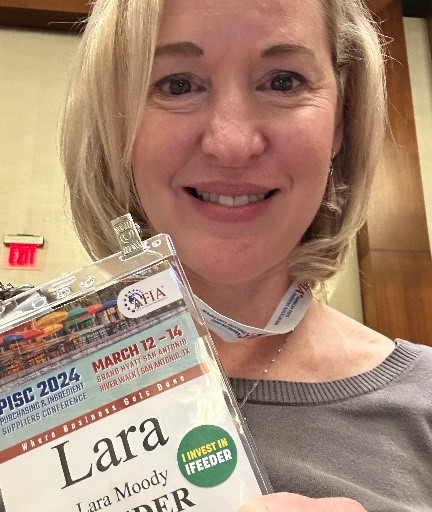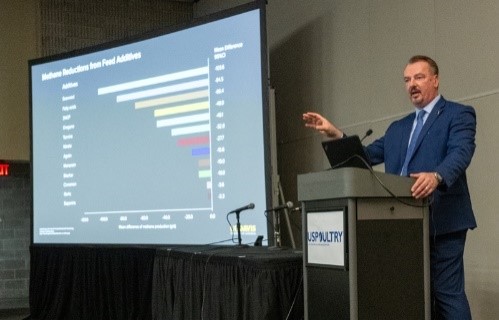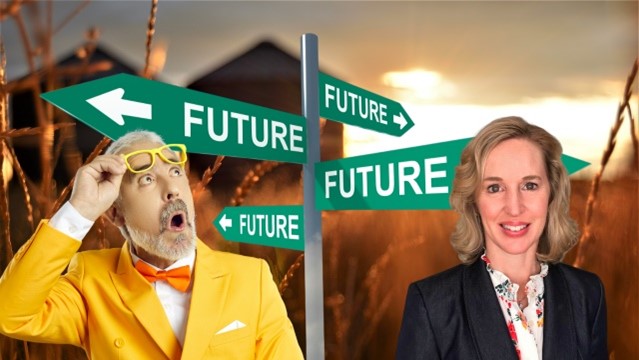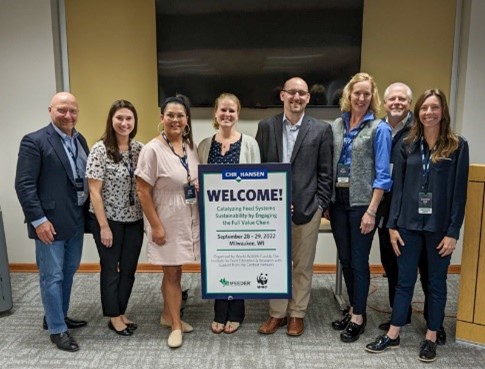IFEEDER Newsletter: Volume 9, Issue 3
March 19, 2024
I Invest in IFEEDER, Will You?
Last week, during the American Feed Industry Association’s Purchasing and Ingredient Suppliers Conference (PISC) and board meetings, the Institute for Feed Education and Research kicked off an effort to increase individual contributions. While we are doing a great job funding projects through corporate contributions and grants, we have several other initiatives, such as support for the Protein PACT, undergraduate student scholarships and the Animal Ag Alliance’s College Aggies Online, for which we do not specifically raise funds.
Suppliers Conference (PISC) and board meetings, the Institute for Feed Education and Research kicked off an effort to increase individual contributions. While we are doing a great job funding projects through corporate contributions and grants, we have several other initiatives, such as support for the Protein PACT, undergraduate student scholarships and the Animal Ag Alliance’s College Aggies Online, for which we do not specifically raise funds.
Individual contributions to our general fund offer a significant opportunity to leverage IFEEDER’s outreach activities with students, consumers and other stakeholders.
With IFEEDER’s new website, growing presence on LinkedIn and this week’s launch of the IFEEDER Fodder blog (more on that below!), we’re upping our game on how we individually reach the animal food industry and our stakeholders. As a result of our fundraising drive at PISC last week, we’ve already made significant gains in the number of first-time individual donors and we’ll be seeking to build on that effort in the coming year.
Check out the blog from Steve Lerner, Ph.D., senior scientific and business advisor for Novonesis Animal and Plant Biosolutions, below on why investing in IFEEDER is a good decision for businesses and individuals looking to leave the industry in a better place than they found it.
Will you invest in IFEEDER so we can invest in the long-term success of the animal food industry?
IFEEDER Board Approves Update to the Pet Food and Livestock Ingredient Consumption Reports
.jpg)
Last week, the IFEEDER Board of Trustees met in San Antonio, Texas, where it approved IFEEDER’s annual budget, including research projects to update the 2020 pet food report and the 2021 feed ingredient consumption report.
The pet food report examined the ingredients used in the production of dog and cat food. Using a reverse engineering methodology, the report assessed the ingredients used and the value of those ingredients in various dog and cat food products, without disclosing the recipes.
The feed ingredient consumption report quantified how much domestic animal feed is consumed, adjusting for regional feed differences and life stages. The previous report assessed ingredient consumption by state and animal sector across 47 ingredient categories. Species included major fish species, beef and dairy cattle, broilers and laying hens, hogs, horses, pets (cats and dogs), sheep and meat goats.
Data from both reports is used by internal and external industry members for various research and market assessments. It is also a great tool for showcasing the breadth of the animal food industry to various audiences, including Capitol Hill staff and university researchers, and responding to media requests.
If you would like to get involved with the pet food and feed ingredient consumption report projects, contact Lara Moody.
IFEEDER Launches New Blog!
For nearly 15 years, IFEEDER has been at the forefront of advancing understanding and trust in sustainable feed and pet food supply chains through research and education. Now, IFEEDER is excited to announce the launch of its blog, IFEEDER Fodder, to deliver even more knowledge and insights to empower informed decisions impacting the future U.S. agriculture. Check out the latest blogs below!
Why Supporting IFEEDER Is Imperative for Companies in Animal Agriculture
In the tapestry of sustainability and innovation, there are stories that serve not just as individual successes but as rallying cries for entire industries. One such unfolding narrative centers around the urgent need for sustainable agriculture—a call that reverberates from the fields to the boardrooms, from rural communities to urban centers. While some players, like Novonesis, have set important precedents, the full story is yet to be written.
Why Dietary Change Is Not the Path to Reducing Animal Agriculture's Environmental Footprint
By: Lara Moody 
The International Production and Processing Expo is an important opportunity for meetings and networking and also where great opportunities for learning occur. I had the opportunity to participate in the Animal Agriculture Sustainability Summit, hosted by the American Feed Industry Association, Meat Institute and U.S. Poultry and Egg Association.
IFEEDER In The Media
Pets, profit and planet: how manufacturers are addressing the triple bottom line: A recent Pet Food Processing article discusses how pet food manufacturers are addressing the triple bottom line. Moody sheds light on the industry’s efforts to balance sustainability, nutritional excellence and economic success.
The Feed Science Podcast Show - Lara Moody: Future of Feed Sustainability:  Sustainable practices in the feed industry are essential for environmental stewardship and ensuring the sector's future. This episode features Moody discussing her path from agricultural engineering to IFEEDER leadership, focusing on innovative sustainable feed strategies. Tune in for her forward-thinking perspectives on feed sustainability on any major podcast platform.
Sustainable practices in the feed industry are essential for environmental stewardship and ensuring the sector's future. This episode features Moody discussing her path from agricultural engineering to IFEEDER leadership, focusing on innovative sustainable feed strategies. Tune in for her forward-thinking perspectives on feed sustainability on any major podcast platform.
Sustainability and environmental footprint in the feed industry: Moody gives recommendations on important reductions and measurements to accomplish industry goals, in this recent Engormix interview.
Donate Now!
For every $1 IFEEDER invests in research and education projects, $5 is leveraged from other sources. All donations go directly toward projects, as IFEEDER's administrative costs are borne by American Feed Industry Association, so your donations go even further. Help us maximize our reach by donating today! Click the link below to make a gift. For questions, contact Lara Moody.
